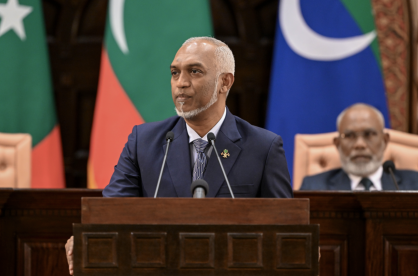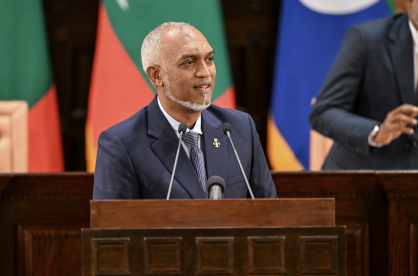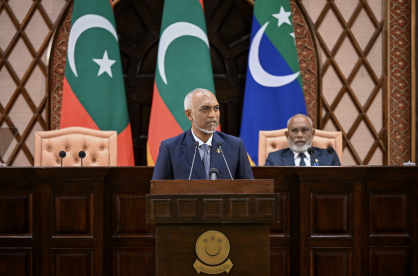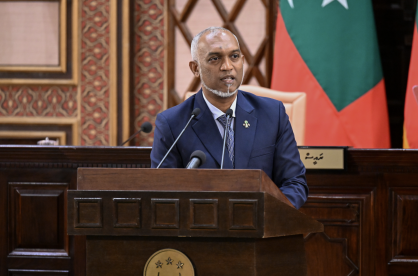India and Maldives have been for generations nigh inseparable. Yet today, the people of the Maldives seem to be of the opinion that this relationship is entirely one sided. As the current administration is fast-tracking a lot of joint projects, it seems a good time now to clear the air.
Independence to both nations from the same oppressive British colonial power came roughly within two decades of each other. India had taken strides to stabilise their borders and their economy as quickly as possible. With a population that grew to a billion people by the turn of the millennium, it was inevitable that they would aspire to be seen as a world power, and neighbours of world powers are usually in a precarious position when it comes to global politics.
In the case of the Maldives, just a stone’s throw south of the peninsula, this worry is distinctly justifiable. The Maldives is an optimum strategic location in terms of placement and geography for a military endeavour and to strong-arm the entire Indo-China region with modern weaponry and naval force. It is also very conveniently in the middle of a major sea trade route, and, had the administrations before been savvier, this route could have opened doors to fortunes unprecedented. Added to that, the gold mine that is tourism, an industry that is already generating billions simply because of the natural environment that the Maldives is endowed with, one could see controlling this nation could be the priority for any world power.
Since the time of President Maumoon, India has taken some pains to assist in the improvement of the Maldives' infrastructure, with IGMH being a prime example. At the time of construction, it was state of the art, able to cater to the Maldivian population, staffed by specialists assigned by the more developed India, with sturdy enough construction to last until today.
During the terror attack and attempted coup by Abdhullah Luthfi, on the third of November, 1988, it was the Indian Army that displayed the tenacity to respond within 16 hours to the calls of help. This instance showcased how vulnerable the small island nation was to attempts at taking over, and also outlined how deeply the Indian government was invested when it comes to maintaining the regional power balance; perhaps not unlike how the Unites States would approach the global power balance.
Until the last three or four years, Maldivians were not as invested in the details of the deals between the two countries. Yet with the Solih administration, it seemed that projects, deals, and diplomatic discussions were now being established at warp speed. Either by intention or coincidence, mistrust and misinformation, due mainly to hard headed 'need to know' security labels that the Solih Administration consistently choses to hide behind regarding the diplomatic relationship, today, multiple news sources and opposition party members are bent on spinning this mistrust to their own end; simplistically that India is planning to takeover the Maldives.
First and foremost, according to India, as a nation it strives to be as politically open and honest at all levels of governance. This is reflected in their dealings with other nations, including their neighbours other than the Maldives, as well as in internal politics and governance. Figures and facts and progress reports, they say, are accessible through their internet archives, and their press releases detail, as much as possible without disrupting state security, how exactly their deals will go through.
Secondly, India makes a case that they firmly believe in cooperation to strengthen their own security. This remains a point of contention though, as a significant number of recent development projects were more militaristic than humanitarian. Yet their stated point of view seeks to deviate from the ‘domination’ trope. For over a decade joint naval military exercises have been taking place between India, the Maldives, and Sri Lanka, and these projects, such as building a naval dockyard and other accompaniments that India will have priority access to and the public has limited awareness of under the oft quoted national security label, are presented merely as a means of furthering the same spirit.
On top of that, the stated objective of providing the helicopters were not merely for humanitarian efforts, but actually to improve maritime domain awareness for the MNDF. To achieve this objective, the Indian government has over two administrations managed to train 42 aviation specialists, including six to fly the helicopters, leaving the vessels in the hands of the Maldivian military. The helicopters do also help push back illegal fishing, drug trafficking, and organised crime, points glossed over in the opposition's fear mongering narrative. In addition, India trains 300 to 400 Maldivian soldiers each year.
Is the relationship between India and Maldives really inevitable? Due to the Indian administration's stated belief in strength in unity, the nation has been taking pains to be recognised as bolstering and conducting capacity building in terms of both infrastructure and human resources of their neighbours. This in turn can be called selfish; the strength of the neighbours equates to stronger borders, which promotes their national security as a result. Yet, this has created a vacuum of dependence upon this one country, while infrastructure development could be done via other means in the first place.
The Maldives as a sovereign nation could most definitely take their project proposals and investment opportunities to the bigger market rather than just to India. This is not an impossible feat; it has been done before, and it could be done again. However, by always opting for the one neighbouring country to provide the people of the Maldives with development and capacity building, the dependancy created sets a precedent for influence on national, as well as, foreign policy. The sovereignty of the island nation would begin to peel off, layer by layer, until a vassal state takes their place, and this must not be allowed to happen.
It is important to demand accountability and transparency. To accept the vulnerability of this island nation is one thing, and to harbour legitimate fears regarding global politics is important as well. Rumours and conspiracies sometimes find root in actual facts, and the administration needs to take steps to either address those concerns, or clearly outline what the deals are between other nations. Too many times has the nation seen grants, loans, and projects being used as tools of diplomacy to extend influence on another nation, and this can only be comprehended if the bastions of this country’s national security, the government, can be trusted to work in the best interests of the people rather than the best interests of the five year tenure.
Multiple projects are running concurrently, projects that could transform the infrastructure landscape of the Maldives, and it is only right to be vigilant as a patriotic citizen when other countries are involved in these transformations. However, it is also a right, as well as a responsibility, to be informed and aware of these bilateral and global relationships, and to this end, one can hope the Maldivian government can maintain transparency as a weapon against misinformation.






